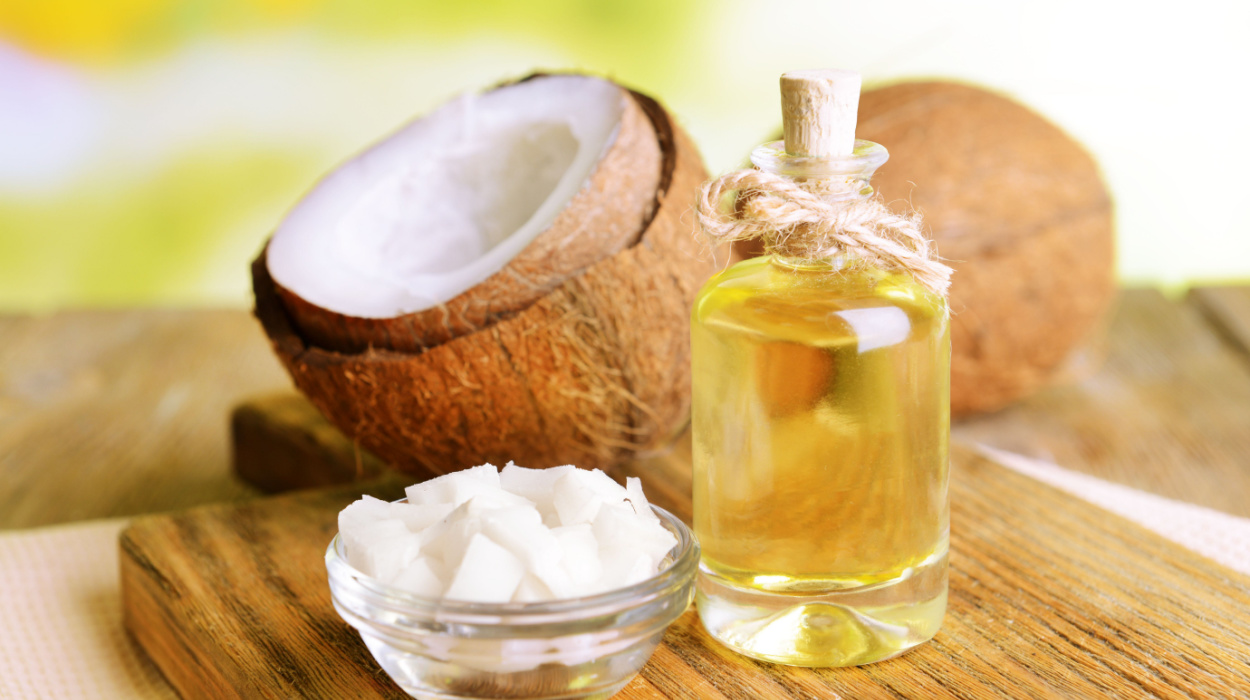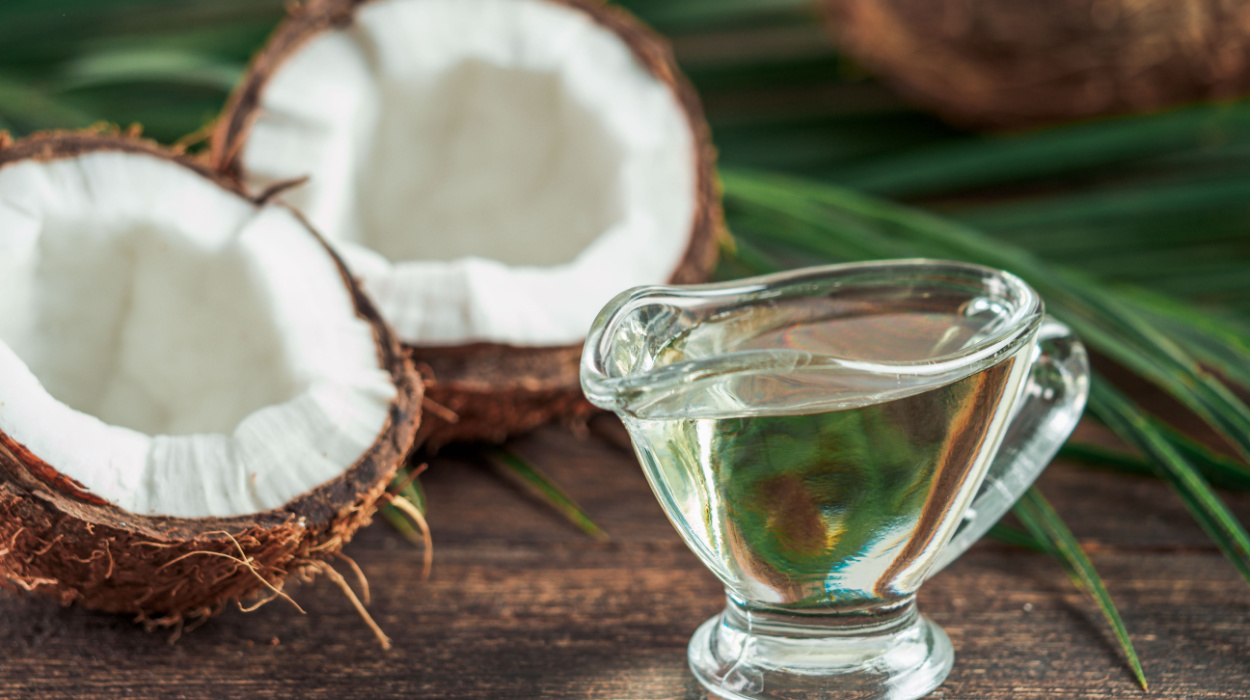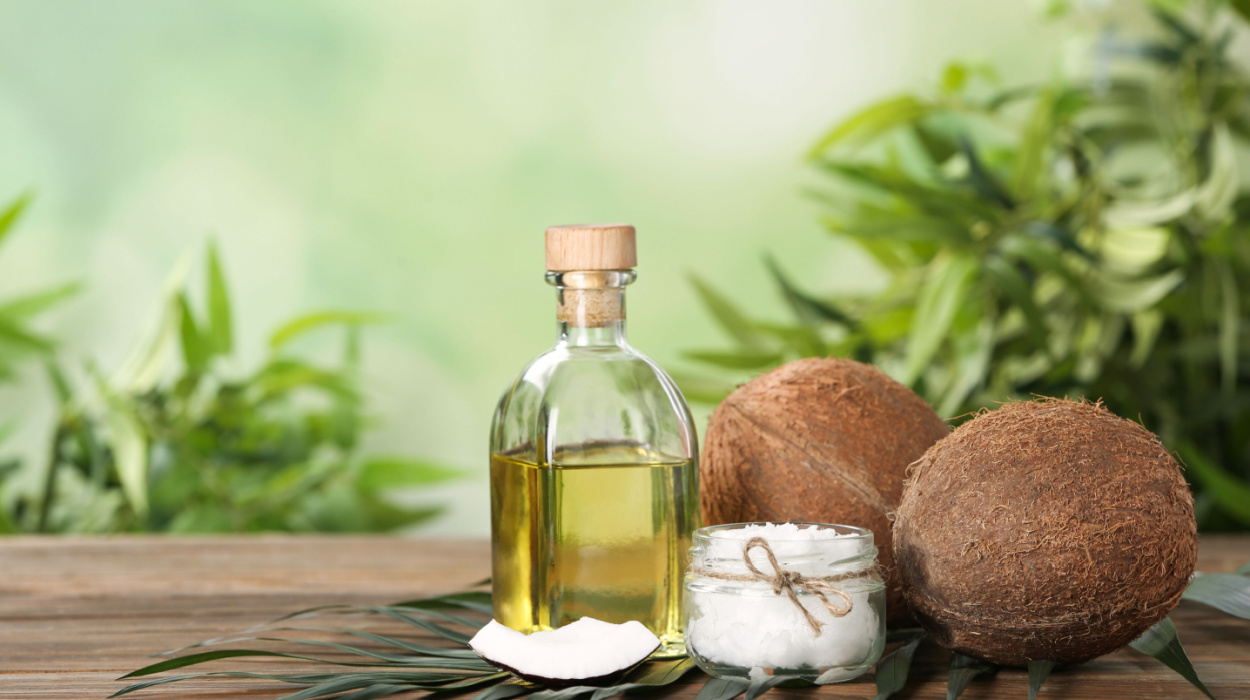Like many foods, coconut oil comes in heavily refined forms, as well as more pure, un-processed forms. Unlike other foods, though, it has a variety of uses that go beyond nutritional value. Coconut oil which contains very high in natural saturated fats can serve as much as a hair and skin protector as a way to lose weight, boost energy, and fight bacterial infections. The medium-chain triglycerides (MCTs) in the oil provide distinct health benefits that other oils cannot provide, due to how MCTs metabolize differently in the body. Coconut oil may even prove life-saving in its effectiveness at treating more serious health conditions.
Top 7 Benefits Of Coconut Oil 2024
- May Aid In Weight Loss
- Serves As A Carrier Oil
- Improves Skin And Hair Health
- May Boost Energy
- Contains Antimicrobial Properties
- Improves Oral Health
- May Treat Alzheimer’s Disease
Top 7 Coconut Oil Benefits
May Aid In Weight Loss
The MCTs (medium-chain triglycerides) in coconut oil may help the body burn more fat, with some evidence suggesting that by including more MCTs in your diet, you can increase the number of calories you burn. While Coconut oil itself has not been proven to promote weight loss, it is made up of 65% MCTs which may have that ability. Coconut oil has been known to increase satiety as well, making it less likely that a person will overeat. Additionally, Coconut oil can help build muscle while also shedding body fat.
Serves As A Carrier Oil
Coconut oil serves as a great carrier oil. In other words, it dilutes other oils so that they can be used more effectively. Essential oils such as tea tree, lavender, rose, sage, and others can be used topically for a variety of skin ailments. The problem is, that these oils are strong and can irritate the skin if too much is applied directly to the skin. Adding a few drops of essential oil to a small amount of Coconut oil helps to dilute the potency, making it easier and more tolerable.
Improves Skin And Hair Health
Coconut oil is often added to or is the base of, many skincare products, including moisturizers, sunscreen, and lip balm. The primary fatty acids in coconut oil make it excellent for skin nourishment. The caprylic and lauric acids in Coconut oil have anti-inflammatory properties, which makes the oil helpful in treating skin conditions as well, such as eczema, psoriasis, and acne. The antioxidants in the oil are antimicrobial and have protective mechanisms, which adds a healing component.
The same is true for hair care – Coconut oil adds protection against and health for damaged hair. When adding Coconut oil to the hair before or after washing it, the oil can prevent the hair from losing protein. The chemical structure of the MCTs in the oil allows the oil to be absorbed more easily on a deep level.
May Boost Energy
Coconut oil may give a quick burst of energy, due to the MCTs in the oil. Unlike long-chain triglycerides (LCTs), MCTs quickly go to the liver, where the liver can convert them into energy (similar to how it uses carbohydrates). For this reason, many athletes use MCTs to enhance their performance. This study[1] denotes that because the MCTs get absorbed by the small intestines intact (not broken down) they are more readily available for the body to use as energy.
Contains Antimicrobial Properties
The lauric acid in the MCTs in Coconut oil has antimicrobial and antifungal effects. Some microbes are healthy, and others can cause disease, such as Staphylococcus aureus, Streptococcus mutants, Streptococcus pyogenes, Escherichia coli (E. coli), and Helicobacter pylori (H. pylori). Coconut oil is effective in preventing the growth of these microorganisms. It may work by either killing and/or preventing the multiplication of these bacteria.
Using Coconut oil internally (ingesting it) can provide medicinal value in treating unwanted microorganisms, such as a fungal overgrowth like Candida. Not only can it curb the bad bacteria and fungi, but it can feed the beneficial microbes in the gut, helping to balance things out. Externally, Coconut oil can be used on cuts or scrapes to help keep the cut clean, as well as used as an oral rinse to keep bacteria in the mouth at bay.
Improves Oral Health

In ancient Ayurvedic tradition, oil pulling is a morning practice for good oral hygiene. Oil pulling involves swishing the mouth with oil instead of mouthwash and letting the oil “pull” out the bacteria and toxins from the mouth. It can easily do this because the bacteria stick to the oil. Coconut oil is the preferred oil for this practice, due to its high antimicrobial properties. In doing so, it can protect the teeth from decay, as well as protect against gum disease.
May Treat Alzheimer’s Disease
Coconut oil has many health benefits, including preventing heart disease and lowering blood pressure but may also help treat Alzheimer’s disease.[2] The MCTs in coconut oil metabolize differently than other oils – they go straight to the liver and can more easily create ketone a necessary energy source for the brain. Ingestion of Coconut oil has been shown to be effective in treating people with cognitive conditions, such as dementia and Alzheimer’s disease.
What Is Coconut Oil?
Coconut oil is extracted from the wick, meat (inside the fruit), or milk of coconut, a tree fruit that grows in tropical regions. Coconut oil hardens in colder temperatures into a waxy, white consistency, however, in warmer temperatures turns into a clear liquid. Coconut oil can be used on hair and skin, as an oral rinse, deodorant, or lip balm, or be added to foods and used for cooking. Some people enjoy diffusing coconut oil to deodorize their homes.
There are many different types of coconut oil including RBD (refined, bleached, and deodorized), raw, virgin (unrefined coconut oil), and extra virgin-although it’s important to note that, nutritionally and chemically, there is very little (if any) difference between “virgin” and “extra virgin” coconut oil. These distinctions are for marketing purposes only.
Coconut Oil Nutrition Ingredients
Coconut oil contains nutrients in the form of vitamins, minerals, and healthy fat, however, contains no protein, carbohydrates, sodium, cholesterol, or fiber. In each tablespoon of coconut oil, there are 14 grams of fat and 125 calories. Coconut oil contains lauric acid, myristic acid, palmitic acid, plant sterols, and MCTs (medium-chain triglycerides).
How To Get Coconut Oil?
Coconut oil is available in plastic or glass jars in almost any food store – it will be sitting on the shelves with other oils and condiments. When searching for coconut oil, it’s helpful to look for different types depending on what you’re using it for. If you’re using coconut oil for cosmetic reasons (hair and skin), you may opt for refined coconut oil or RBD (refined, bleached, and deodorized). This oil is filtered considerably so it has less nutritional value and taste. A better option is virgin coconut oil – it has minimal processing and may be just as good for your beauty needs. For cooking and eating, you’ll want to buy raw coconut oil. This has many health benefits and is considered the purest form of coconut oil.
How Can You Use Coconut Oil Every Day?

It is safe to use coconut oil every day for almost any purpose, however, if using it in your diet, you’ll want to make sure there are no contraindications with any medications you’re taking or specific health conditions. If using the oil to treat a medical condition, please refer to your physician who will recommend the frequency, length of time, and dosage.
Here are some ways to use Coconut oil every day: Oil pulling for oral hygiene, cooking, moisturizing skin, hair, and lips, removing eye makeup, diffusing the oil for a pleasant scent in your home, and shining wood furniture. Coconut oil also works as a natural deodorant and a bug repellant.
Conclusion
Coconut oil has been used as a culinary and medicinal supplement for hundreds of years in many cultures. The health benefits of consuming coconut oil are far-reaching, from treating cognitive impairment to killing bacteria, improving digestion, to aiding in weight loss. The oil may also be used cosmetically in place of skin moisturizer, hair condition, lip balm, deodorant, and anti-inflammatory cream.
Frequently Asked Questions
Coconut oil can be safely cooked at high heat, but it’s best to buy raw coconut oil, since it is minimally processed, if at all, and will contain a high amount of nutrients.
It should be safe to use Coconut oil on your skin daily, but if you’ve never used it before, you’ll want to do a “patch test” to ensure you do not have a negative reaction. Simply apply a little oil on your skin and wait a few hours to see if there is any redness or undesired reaction. Assuming there isn’t, it’s safe to use.
It certainly can, but this is bio-individual. Adding Coconut oil to your diet may boost metabolism and fat burning, while also helping you stay fuller longer. However, this tactic alone may not be enough and is best added to a routine of exercise and other dietary changes.
 Expert's opinion
Expert's opinion
